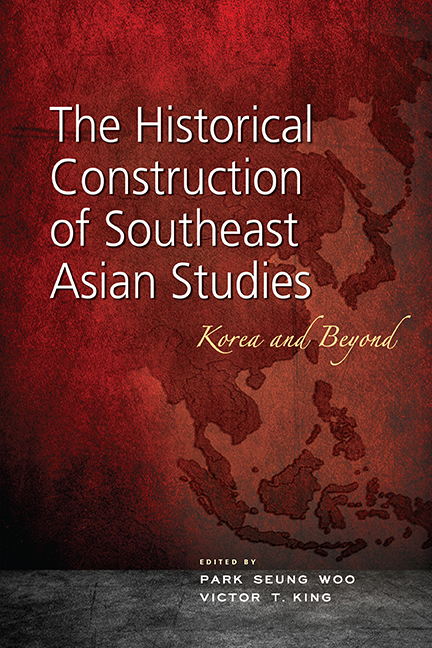Book contents
- Frontmatter
- Contents
- List of Tables
- List of Figures
- Foreword
- Acknowledgements
- About the Contributors
- 1 Introduction: The Historical Construction of Southeast Asian Studies and the Emergence of a Region
- PART I NORTHEAST ASIA
- PART II SOUTHEAST ASIA
- 5 Contentious Development: Southeast Asian Studies in Singapore
- 6 The Construction and Institutionalization of Southeast Asian Studies in Vietnam: Focusing on Insiders’ Perceptions and Assessment
- 7 Popular Culture for a New Southeast Asian Studies?
- PART III EUROPE
- PART IV AUSTRALIA AND THE U.S.
- Index
7 - Popular Culture for a New Southeast Asian Studies?
from PART II - SOUTHEAST ASIA
Published online by Cambridge University Press: 21 October 2015
- Frontmatter
- Contents
- List of Tables
- List of Figures
- Foreword
- Acknowledgements
- About the Contributors
- 1 Introduction: The Historical Construction of Southeast Asian Studies and the Emergence of a Region
- PART I NORTHEAST ASIA
- PART II SOUTHEAST ASIA
- 5 Contentious Development: Southeast Asian Studies in Singapore
- 6 The Construction and Institutionalization of Southeast Asian Studies in Vietnam: Focusing on Insiders’ Perceptions and Assessment
- 7 Popular Culture for a New Southeast Asian Studies?
- PART III EUROPE
- PART IV AUSTRALIA AND THE U.S.
- Index
Summary
INTRODUCTION
Focusing on the prospect of a locally based Southeast Asian Studies in the near future, this chapter necessarily takes a different approach and framework from most of the other chapters. For political and historical reasons, Southeast Asian Studies, as we know it today, has for the past several decades had its major centres of excellence half a globe away from Southeast Asia, no matter how one might define the region. With the exception of Singapore, formal training and research in Southeast Asian Studies in the region are fairly new and small in size and impact in comparison both to academic activities in other fields of enquiry, as well as in comparison to area studies in several countries outside the region. Understandably, most historical analysis of area studies has referred largely to key texts, ideas, persons and institutions from other regions. While such an exercise is highly valuable, it raises a number of intellectual, political and ethical issues as I have explored them elsewhere (Heryanto 2002). Building on that article, I wish to consider below the prospects for a home-grown Southeast Asian Studies in the twenty-first century, and speculate what such studies might look like. I must admit from the start, I do not have any ready answers to these important yet difficult questions. However, I hope this modest attempt is a worthy step. More specifically, this is a preliminary attempt to consider the initial and potential contribution of intra-Asian popular cultural flows to the future of a locally based area studies of the region, its people and its historical trajectory, as one possible form of successor to the old Southeast Asian Studies from the Cold War era.
Unlike most analyses of prominent Southeast Asian Studies in other regions, we are faced with a rather limited range of locally published and accessible ideas when examining the case within the otherwise rich intellectual traditions of the region itself. Instead of following the usual practice of looking back to milestones, key texts, authors, and debates of area studies in the past, local conditions have led me to focus on the present potentials and possible future.
- Type
- Chapter
- Information
- The Historical Construction of Southeast Asian StudiesKorea and Beyond, pp. 226 - 262Publisher: ISEAS–Yusof Ishak InstitutePrint publication year: 2013



